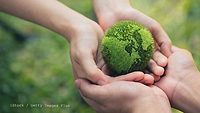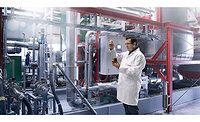Researchers Receive Funding to Convert PVC Waste Products into Adhesives

Scott Svadlenak, right, and Kostas Goulas, discuss possible reaction mechanisms for the PVC to waxes process. Photo by Johanna Carson.
Researchers at Oregon State University College of Engineering have received funding to develop a process to convert waste polyvinyl chloride (PVC) into a wax that can be used as an adhesive. PVC is ubiquitous in the construction sector, and has a large presence in health care, including surgical tubing, IV fluid bags, and oxygen masks. It’s found in consumer products from teething rings to pet toys.
However, PVC is difficult to recycle and can release harmful dioxins when disposed of through incineration. OSU’s Kostas Goulas, assistant professor of chemical engineering said, “The major industrial pain point we are trying to address is that the current methods to recycle PVC waste are too expensive or inappropriate for many PVC waste streams. For example, recycling vinyl flooring waste is difficult and costly. We think that our method is significantly improved over previous attempts to recycle or upcycle PVC.”
Goulas and students Scott Svadlenak, Makayla Vu, and Sophie Wojcik are working on a hydrothermal treatment and hydrogenation process that can deal with contaminated waste while sequestering chlorine as salt and carbon as a valuable hydrocarbon wax.
“Our method works by removing the chlorine from the waste PVC polymer and hydrogenating the intermediate unsaturated polymer formed from the PVC to a hydrocarbon wax,” said Goulas.
Sodium chloride, or rock salt, is among the raw materials used in making PVC. Typically, chlorine is industrially produced from salt through electrolysis. The sodium chloride yielded from the wax production can be used for the synthesis of new PVC.
Goulas added, “We think that the wax can be used as a hot melt adhesive wax. Compared to solvent-based adhesives, hot melt adhesives have the advantage of not containing potentially harmful volatile organic compounds. We think an adhesive that doesn’t have VOCs is a big advantage in the flooring industry, where adhesive is extensively used. Working with the flooring industry also enables us to use a single value chain for both our raw materials and our products.”
The research group is currently focusing on optimizing the yield of the catalytic process and the quality of the wax produced from different types of PVC waste. The researchers are exploring the technology as the basis for a startup company and are working with PVC building materials partners to better understand the partners’ needs and to try to secure a steady flow of waste.
The Vinyl Institute has so far provided a one-year grant of $100,000, with the potential of an additional $200,000 over two more years.
VentureWell, a nonprofit that assists university faculty and students in the creation of socially beneficial businesses, has awarded the Goulas lab a $25,000 grant for the PVC-to-adhesive project.
To learn more, visit www.oregonstate.edu.
Looking for a reprint of this article?
From high-res PDFs to custom plaques, order your copy today!





